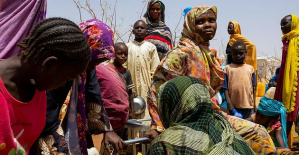All of the countries who in recent times dropped out of the UN's new guidelines for migration have one thing in common.
They are afraid that a invandringsfientlig hemmaopinion shall sweep them away from the power of the ”written” despite the fact that migrationspakten is non-binding.
as late as in July appeared the new guidelines for how the migration should be regulated, and migrants are not treated to be completely uncontroversial. The only country that dropped out at an early stage was the united states which was seen as part of the president Trumps the public's unwillingness to accept international agreements.
But the last few months a number of countries announced that they would not be present in Morocco where the settlement was yesterday.
It began with Australia and has continued with Hungary, Poland, Austria, Israel, Switzerland, Slovakia and a number of other countries, where the nationalist feeling is strong. Last is the Latvia, who surprisingly said no.
All of which are countries where the issue of immigration is a very hot and sensitive. In many cases, the top of the agenda when it held the election. So, even if the agreement is non-binding so have those in power in these countries belatedly pulled the ears. Not least because of a storm in the social media against the migrationsuppgörelsen.
So what is it in the contract that scares defectors?
In the 34-page document, there are a number of wordings that migrants have certain human rights and that these should be respected. Beneficiary countries shall ensure that migrants have access to basic health care, protection, etc. This interprets the critics that countries have a legal duty to meet these requirements.
But it is not. The pact says explicitly that it is up to each country to decide for themselves how to regulate their immigration and how migrants are treated. The agreement is more to see as a recommendation.
Critics argue that it is only a matter of time before demands will be raised that the agreement shall become part of the countries of the common law, as it has been done with the UN child convention in some countries, including Sweden.
however, This is up to each country, then there is nothing legally binding in the agreement.
When is an objection of course that why sign a document if it does not matter if you follow it or not.
the Idea with the migrationsdokumentet is good. How refugees should be treated is already regulated in, inter alia, the UN convention on refugees. Now you want to lay the foundations for a similar someone are enormous for migrants but without taking away from the sovereign states of their right to decide over the migration and the without to make it legally binding.
Therein lies part of the problem.
the Document consists of a lot of praiseworthy statements about how leaders around the world want the world to see. But it is obvious to all who read through the 32 pages there is more about wishful thinking than on reality.
the World's leaders want to show they are nice and humane, and therefore many prepared to give their approval. Had the document been legally binding had it not been a chance to get through it. Very many countries have no plans to follow the recommendations that they accepted during the two years it took to negotiate the settlement.
the basic problem is that there are many more people around the world who want to migrate than the number of countries in the world have a need or want to receive. Many tens of millions more. In the wake of climate change, they learn not to be fewer.
One consequence has been that migrants and refugees today are mixed together. Many migrants abuse the asylinstrumentet. They are seeking asylum despite the fact that the only thing they really want is to get a job so they can send money home to his family and relatives. It compromises the popular acceptance of the right of asylum.
the Result is that the development in a number of countries are moving toward putting up barriers to deter and prevent all non-regulated immigration. The latest example is Denmark's plans to place all unwanted immigrants on a small island. A copy of what Australia is already doing.
So long as this inherent contradiction is not resolved, the migrants ' rights always to hang loose. No matter that the 164 countries approved the new agreement and the rest let be.

 Sudan ravaged by a year of war
Sudan ravaged by a year of war Ten years after the kidnapping of the Chibok girls, what has become of the terrorist group Boko Haram?
Ten years after the kidnapping of the Chibok girls, what has become of the terrorist group Boko Haram? The Israeli government divided on the extent of its response after Iran's direct attack on its territory
The Israeli government divided on the extent of its response after Iran's direct attack on its territory “Is it time for a killing blow?” : the Israeli press wonders about a response after the Iranian attack
“Is it time for a killing blow?” : the Israeli press wonders about a response after the Iranian attack Covid-19: everything you need to know about the new vaccination campaign which is starting
Covid-19: everything you need to know about the new vaccination campaign which is starting The best laptops of the moment boast artificial intelligence
The best laptops of the moment boast artificial intelligence Amazon invests 700 million in robotizing its warehouses in Europe
Amazon invests 700 million in robotizing its warehouses in Europe Inflation rises to 3.2% in March due to gasoline and electricity bills
Inflation rises to 3.2% in March due to gasoline and electricity bills Large French companies are alarmed by the stalling of the European economy
Large French companies are alarmed by the stalling of the European economy New sanctions against Russia send industrial metal prices soaring
New sanctions against Russia send industrial metal prices soaring Olympic Games 2024: civil servants authorized to carry out private security activities
Olympic Games 2024: civil servants authorized to carry out private security activities Threat of strikes for the 2024 Olympics: Macron says he has “confidence” in the “spirit of responsibility” of the unions
Threat of strikes for the 2024 Olympics: Macron says he has “confidence” in the “spirit of responsibility” of the unions Musical show: “Come Bach”, fantasies around the composer
Musical show: “Come Bach”, fantasies around the composer The cry of alarm from Senghor's friends has been heard
The cry of alarm from Senghor's friends has been heard World Chess Championship: Nepomniachtchi and Gukesh lead the candidates tournament
World Chess Championship: Nepomniachtchi and Gukesh lead the candidates tournament Rapper Heuss L’Enfoiré calls on Ronaldinho for his new music video
Rapper Heuss L’Enfoiré calls on Ronaldinho for his new music video Skoda Kodiaq 2024: a 'beast' plug-in hybrid SUV
Skoda Kodiaq 2024: a 'beast' plug-in hybrid SUV Tesla launches a new Model Y with 600 km of autonomy at a "more accessible price"
Tesla launches a new Model Y with 600 km of autonomy at a "more accessible price" The 10 best-selling cars in March 2024 in Spain: sales fall due to Easter
The 10 best-selling cars in March 2024 in Spain: sales fall due to Easter A private jet company buys more than 100 flying cars
A private jet company buys more than 100 flying cars This is how housing prices have changed in Spain in the last decade
This is how housing prices have changed in Spain in the last decade The home mortgage firm drops 10% in January and interest soars to 3.46%
The home mortgage firm drops 10% in January and interest soars to 3.46% The jewel of the Rocío de Nagüeles urbanization: a dream villa in Marbella
The jewel of the Rocío de Nagüeles urbanization: a dream villa in Marbella Rental prices grow by 7.3% in February: where does it go up and where does it go down?
Rental prices grow by 7.3% in February: where does it go up and where does it go down? Europeans: the schedule of debates to follow between now and June 9
Europeans: the schedule of debates to follow between now and June 9 Europeans: “In France, there is a left and there is a right,” assures Bellamy
Europeans: “In France, there is a left and there is a right,” assures Bellamy During the night of the economy, the right points out the budgetary flaws of the macronie
During the night of the economy, the right points out the budgetary flaws of the macronie Europeans: Glucksmann denounces “Emmanuel Macron’s failure” in the face of Bardella’s success
Europeans: Glucksmann denounces “Emmanuel Macron’s failure” in the face of Bardella’s success These French cities that will boycott the World Cup in Qatar
These French cities that will boycott the World Cup in Qatar Augusta Masters: the unchallenged reign of Scottie Scheffler
Augusta Masters: the unchallenged reign of Scottie Scheffler Tennis: Harold Mayot takes Cachin and goes to the second round in Barcelona
Tennis: Harold Mayot takes Cachin and goes to the second round in Barcelona Barça-PSG: “We will do it”, Luis Enrique shows his confidence before the return match
Barça-PSG: “We will do it”, Luis Enrique shows his confidence before the return match Hakimi on Mbappé before Barça-PSG: “I feel very good, very motivated, like the whole team”
Hakimi on Mbappé before Barça-PSG: “I feel very good, very motivated, like the whole team”


















